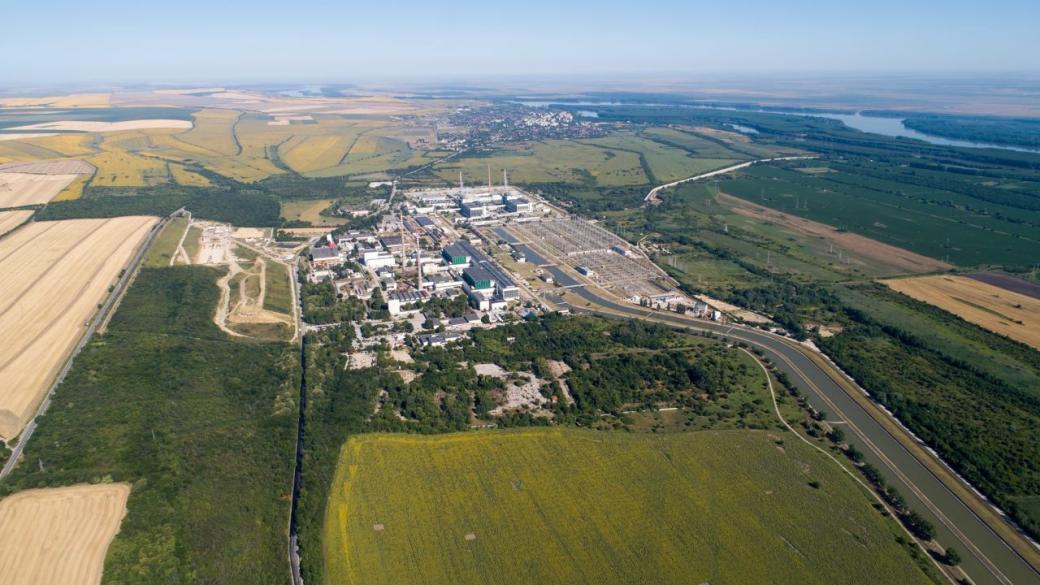Bulgarian nuclear hopes – cluttered with unknowns
Neither nuclear project has received official investor interest, and it is unclear how competitive the electricity they will produce will be.

© ECONOMIC.BG / АЕЦ Козлодуй – Нови мощности ЕАД/Facebook
While everyone is talking about solar panels and wind farms these days, the development of Bulgaria's nuclear energy sector seems to be lagging behind. For the past three years, in addition to the COVID pandemic, Bulatom has put on hold its otherwise annual nuclear conference, which discusses the problems, prospects and opportunities in the sector. This year the forum resumed, but predictably there were almost no Russian representatives. There were, however, presentations by Bulgaria's new partners, such as France's Electricité de France (EDF). Ambassadors from seven countries and representatives of the European Commission (EC) also attended the event.
The Kozloduy NPP plan
The revival of the idea of a unit 7 at the Kozloduy NPP started as early as 2020 by the government of Boyko Borissov, who spoke of a project with "radically different technology from the current one," i.e. Russian. Another idea was to use the equipment available for the Belene NPP in the new units, but this was dropped and US companies began to look for the construction of the new capacity. Three years later, at the beginning of this year, the National Assembly adopted a decision for the Council of Ministers to negotiate with the US government to conclude an intergovernmental agreement for the construction of new nuclear power capacity at the Kozloduy NPP using AR1000 technology. This has not yet been concluded. In March, a Memorandum of Understanding was signed between Westinghouse and Kozloduy NPP-New Capacities for the design and possible construction of a new nuclear unit. A joint working group has been set up between the two parties to plan the possible use of one or more AP1000 reactors.
During the Bulatom conference, Valentin Iliev, who recently rejoined the company to head the new reactor, said that the results of the feasibility study (FEED) with the US company will be ready in 2024. A site for a new nuclear power plant has been approved by the Nuclear Regulation Agency (NRA). There is an EIA for the construction of unit 7, which is legally valid.
"For unit 7, we are ready to start work," says Iliev.
So far, everything sounds good, but in order to make an official decision on whether to build new nuclear power, our country first needs to have a functioning parliament and government.
According to Iliev, this is why things are going "slowly and painfully," but he hopes that with the support of the new cabinet, things will move forward.
"If there is a will, there are reasons to take a decision and move forward. Without the support of the government, everything here is meaningless." He explained that things were not so clear and advanced for Unit 8.
"However, for unit 8, the procedures have not yet started and there may be problems because of the existing technical cooling of the Kozloduy NPP," which he said is almost at its limit with the new two units.
Iliev also said that the project has been at the siting stage for 11 years, and if we want to meet the strategic vision (unit 7 by 2045 - ed.), things need to move faster.
Although the study is already underway, there is no estimate of how much the new unit will cost, Iliev said. Asked by Economic.bg whether he expected a reshuffle in his post, he said that Kozloduy Nuclear Power Plant New Build was a state-owned company and everything depended on the government.
The possibility of building unit 7 is currently the fastest option for Bulgaria to have new baseload capacity, but three years after the relaunch of the project, it is still at the same stage as it was more than 10 years ago, namely exploration by Westinghouse, which even then promised investments, project development and the opening of thousands of jobs, but gave up in 2015.
It should be noted that the decision to build an "American" unit at the Kozloduy NPP earlier this year was supported by GERB-CDF, DPS and Democratic Bulgaria, while ProDevelopment voted "abstention" and BSP and Revival strongly opposed the new power station with US technology.
The Belene NPP adventure
More than half a century ago, there was talk of building a "second nuclear power plant" in Bulgaria, and a book could be written about its history. The plant came back to the fore in the strategic vision of former minister Rossen Hristov, citing the untapped value of the site. During the nuclear conference, the status of the project was presented by Lorin Lorinkov, head of department at the National Electricity Company (NEK). He made it clear that the site has been approved by the Nuclear Regulatory Authority (NRA), an EIA has been carried out, the infrastructure is in place and two Russian reactors costing BGN 2.5 billion are available. Some small parts still have to be supplied from Russia, but experts say this will not be a problem.
The Electricity System Operator (ESO) commented on the connection of the plant to the system, which would require the construction of a 100 km power line and a new substation at a cost of about BGN 250 million.
And although, according to Rosen Hristov, there is investor interest in the project, no one has officially declared it.
In fact, the power plant is being targeted mainly by developers who want to build it but not invest in it. This is the case with French giant EDF, with whom a contract for a further feasibility study is due to be signed soon. The aim is to find out whether Russian reactors can work with European technology and not be dependent on Russia for their implementation and operation.
EDF said at the conference that it would "help" Bulgaria with its nuclear projects. Analyses of such complex projects take at least a year, which means that clarity and vision for Belene cannot be expected this year or next, as there is still no agreement with EDF. In short, the status of the project is that we have a multi-billion asset on site, but we don't know what or if it makes sense to do anything with it. One thing is clear: it will take many more billions to complete the plant, and we do not know where it will come from.
Business and economists also have no clear answer to the question of whether Bulgaria needs new nuclear capacity. This is because of the unknowns surrounding it — who will build it, how much it will cost, when it will be ready, at what price it will produce, will it be competitive on the market and, last but not least, who will work in it.
But the industry needs predictability and timely decisions. The Executive Director of the Bulgarian Federation of Industrial Energy Consumers (BFIEC), Ivaylo Naydenov, commented that "new energy projects should only be developed on a market basis (without feed-in tariffs, etc.)."
According to Kaloyan Staykov, chief economist at the Institute of Energy Management, "the economic cycle has turned and it is time to be more sensible and make policy and investment decisions at the right time."
He says it is now increasingly difficult to predict what the market will look like in the coming years, "it's absurd to have a strategy for 2050 when we don't know what's going to happen this summer and winter."
There are still many more questions than answers on both projects, and once we have paid for the studies for both nuclear projects and they are ready, there is no telling what the political situation in the country will be. It has been quite unstable recently, and projects of this scale require strong political will. So we may find ourselves once again in a situation of half-baked solutions, and the wheel continues to turn without really knowing what we are doing.
Nuclear energy has always been a special sector for Bulgaria, in which our country has accumulated a lot of experience and expertise. Surveys show that society also supports its development, even if it does not understand the subject. Bulgaria certainly needs to replace its basic coal capacity, and this is one of the options, but the economic potential of both projects is still as unclear as it was when they were started.

 Aleksandra Sotirova-Delcheva
Aleksandra Sotirova-Delcheva 

